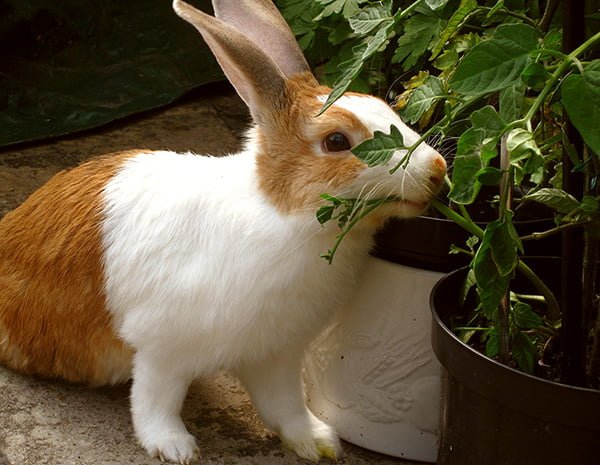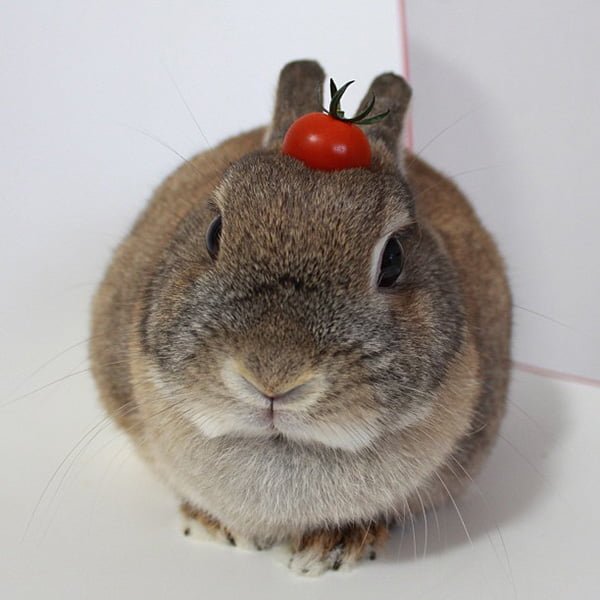It's very tempting to feed your pet rabbit treats! Surely its diet of hay or pelleted food gets tiresome, right? Why not feed your pet some fruits and vegetables as a tasty treat? Tomatoes are frequently one of the foods that rabbit owners would like to give their rabbit as a treat - but is it safe? Can rabbits eat tomatoes? We'll tell you all you need to know below!
Can Rabbits Eat Tomatoes?
Yes, rabbits can eat tomatoes, and there isn't anything toxic to rabbits in tomato fruit - but only as an occasional treat! Rabbits are herbivores, but that doesn't mean that they can eat just any fruit, vegetable, or grain without consideration. They have dietary needs that are most readily achieved by eating grain forages, such as hay or grasses. Tomatoes and vegetables can supplement rabbits' diet, but they aren't particularly necessary. And in some rabbits, tomatoes can cause a real problem.
The Health Benefits Of Eating Tomatoes
Tomatoes are often lumped in with other vegetables, but they're actually a type of fruit - specifically, a berry! Along with being low in fat and having a high water content, tomatoes offer many health benefits to both humans and rabbits.
Vitamins
Tomatoes are an excellent source of vitamins C, A, B6, and K. These vitamins support the immune system, bone development, blood clotting, cell function, and reproductive health.
Minerals
Potassium is beneficial for blood pressure and heart health and is found in abundance in tomatoes.
Antioxidants
Some of the vitamins listed above have antioxidant properties, but tomatoes contain others as well! The antioxidant lycopene is particularly concentrated in tomatoes and gives them their deep red color. Orange tomatoes have less lycopene but more beta-carotene - another essential antioxidant.
Fiber
A key part of rabbits diet is their high fiber content, and tomatoes are very high in fiber! This helps give the digestive system in good shape.
The Downside To Rabbits Eating Tomatoes
The key part of a rabbit's diet is fiber, and their natural diet is low in both sugar and fat. Most of what they eat should be plant forage, such as hay and grasses. These plants are high in fiber and also help keep the rabbit's teeth healthy. And although tomatoes have high fiber content, they don't check the other boxes - and they introduce other health concerns.

Source: Flickr
Pesticides + Pests
Many tomatoes found in your grocery store have been sprayed with pesticides at some point. These chemicals are harmful to the adult body - imagine how they affect the much smaller body of a rabbit! If you've grown the tomato yourself and know that there were no pesticides used, you then need to keep an eye out for the pests themselves. Many types of worms like to feast on tomatoes, which can cause great harm to a rabbit if ingested.
High Sugar Content
You might not consider tomatoes to be high in sugar - and, in a human's diet, they aren't. Compared with the foods we typically label as fruits, tomatoes aren't high in sugar at all! But place a tomato next to a rabbit's natural diet, and tomatoes suddenly become highly sugary treats. If your rabbit has obesity problems, tomatoes should be avoided altogether. Offering too many tomatoes can also lead to diarrhea due to the sugar content.
Highly Acidic
Tomatoes are a highly acidic food. Humans struggle with the acid level of tomatoes frequently, and rabbits do as well. It can cause indigestion and stomach pain.
Kidney Issues
Tomatoes are high in phosphorus. Phosphorus is an important mineral, but kidney stones and renal dysfunction are common problems for rabbits. And phosphorus exacerbates kidney issues. If you've been feeding your rabbit tomatoes and notice any changes in their urine or any sort of odd behavior, stop feeding tomatoes immediately and offer only hay until symptoms improve.
Gastrointestinal Stasis
Gastrointestinal stasis is a condition that occurs when a rabbit's diet lacks fiber, and it causes their digestive tract to seize up and is often fatal. A rabbit that gets too accustomed to low-fiber treats (which tomatoes are when compared to hay and grasses) won't eat the fiber they need to function.

Source: Flickr
What Is The Best Way For Rabbits To Eat Tomatoes?
The main consideration when feeding tomatoes to your rabbit is the serving size. A rabbit should be fed a portion of tomato equal to the size of one cherry tomato and should only eat this one or two times a week!
Be sure to fully remove any tomato stem, leaves, or seeds from the fruit, and wash it thoroughly to remove any pesticides or pests. The best thing about this is you can use the seeds to grow tomato plants at home and get more tomatoes!
Frequently Asked Questions
Can Baby Rabbits Eat Tomatoes?
Bunnies have an even more sensitive digestive system than adult rabbits. In fact, bunnies shouldn't be fed any fruits or vegetables until they are at least 12 weeks old.
Can Rabbits Eat Tomato Leaves?
If roughage and plant fibers are of high value to rabbits, you might wonder if feeding your rabbit tomato leaves would be better than the fruit itself. Don't do it! The green parts of the tomato plant contain a chemical called solanine, which becomes tomatidine when digested. This substance is toxic to rabbits and most animals and will cause severe gastrointestinal distress. The leaves, stems, flowers, and green tomatoes themselves should all be avoided.
Can Rabbits Eat Tomatoes If They've Been Canned?
Store bought tomatoes and canned tomato products have added sugar and stabilizing additives and should be avoided. If you can tomatoes yourself, you can cut off a chunk of canned whole tomato if you did not add any sugar or salt during the canning process.
Can Rabbits Eat Cherry Tomatoes Or Yellow Tomatoes?
Yes, rabbits can eat these tomato varieties. Cherry tomatoes and yellow tomatoes are much lower in acid when compared to typical red tomatoes.
Can Bunnies Eat Tomato Seeds?
No. While it takes a lot of tomato seeds to be considered toxic, it is best to remove seeds before you feed tomatoes to your bunny.
